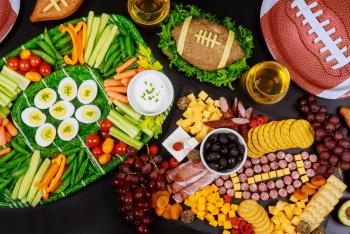Football game days are a time for fun and celebration, but they don’t have to derail your health...
Read More
After bariatric surgery, your body needs time to adjust to a smaller stomach. While smaller, more frequent meals are key to recovery, snacking—when done mindfully—can help maintain steady blood sugar levels and support weight management.
Understanding the difference between snacking and grazing is essential for maintaining progress after bariatric surgery. Snacking involves consuming a specific portion of food at planned times, and grazing refers to eating small amounts throughout the day without regard for portion size or nutritional value.
“Grazing can easily lead to consuming excess calories, which can undermine your health goals, but mindful snacking, when done properly, can support your health by ensuring you get the right nutrients in controlled amounts,” said Bradee Rojas, MS, RD, CDCES, Metabolic and Bariatric Surgery Program Coordinator at Inspira Medical Center Mullica Hill.
Mindful snacking can play a key role in sustaining your health after surgery. Choosing nutrient-dense snacks helps keep blood sugar stable and energy levels consistent. Proper snacks provide essential nutrients, such as protein and fiber, which help keep you feeling full longer and prevent overeating later. Mindful snacking also prevents the temptation to make poor food choices due to hunger or fatigue.
“It’s important to balance snacks with healthy habits, such as regular physical activity and proper sleep,” said Rojas. “When done with mindfulness, snacking can support your long-term goals, like maintaining a healthy weight and improving energy levels.”
To integrate snacking into your post-surgery lifestyle, follow these strategies:
Plan your Portions: Choose small, nutrient-dense snacks and stick to a specific portion size. Snack two hours before or after meals to avoid overeating.
Focus on protein and fiber: Protein helps you feel fuller for longer periods and supports muscle health, while fiber aids digestion and keeps blood sugar steady,” said Rojas. “Look for snacks that combine these nutrients for the best results.”
Identify your triggers: Snacking can be driven by emotions, such as stress, boredom or fatigue. Before snacking, pause and ask yourself: Am I truly hungry, or is this an emotional craving? If you're experiencing emotional hunger, consider addressing it with stress-relief techniques, a walk or a brief distraction.
Avoid distractions: Focus on your snack rather than eating while distracted, like watching TV or scrolling on your phone. This practice helps prevent overeating and makes it easier to recognize when you're full.
Adopt healthy habits: Regular exercise (at least 30 minutes a day) and a good sleep routine help regulate your hunger and keep you on track with your goals.
When selecting snacks, combine protein with healthy fats or complex carbohydrates. Here are some nutritious choices:
“Processed snacks labeled high-protein or low-calorie can be filled with added sugars or preservatives, so you ideally want to choose whole foods like fruits, vegetables and nuts,” said Rojas. “If you opt for processed items, be mindful of portion sizes and ingredients.”
It’s easy to confuse thirst with hunger, leading to unnecessary snacking. Stay hydrated by drinking at least 64 ounces of water daily. Proper hydration helps regulate your appetite and supports overall metabolic health. Aim to sip water throughout the day rather than consuming large amounts at once.
If you’re struggling with snacking or overeating after surgery, consider consulting with a registered dietician. They can provide tailored advice to help you stay on track with your health goals.
By being mindful of your snacking habits and adopting healthy lifestyle practices, you can continue progressing toward your long-term wellness after bariatric surgery.
Take the next step in your weight loss journey with Inspira. Learn more about our bariatric services and surgery options.

Football game days are a time for fun and celebration, but they don’t have to derail your health...
Read More
Pumpkin spice lattes can be high in sugar, often exceeding daily limits in a single serving. To...
Read More
Choosing to undergo weight loss surgery is a significant and deeply personal decision. For those...
Read More
The material set forth in this site in no way seeks to diagnose or treat illness or to serve as a substitute for professional medical care. Please speak with your health care provider if you have a health concern or if you are considering adopting any exercise program or dietary guidelines. For permission to reprint any portion of this website or to be removed from a notification list, please contact us at (856) 537-6772